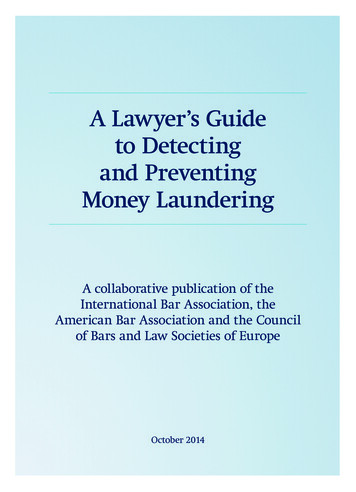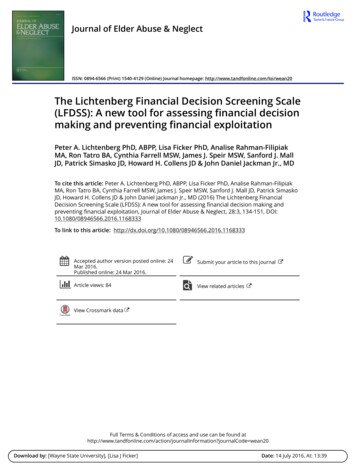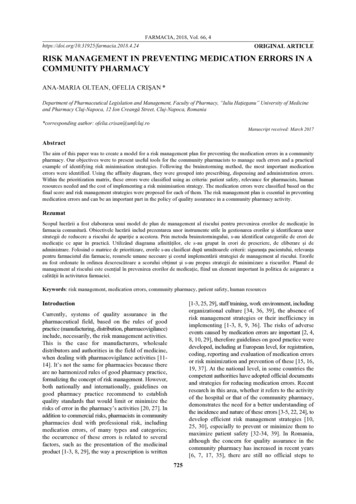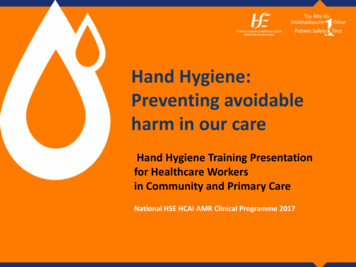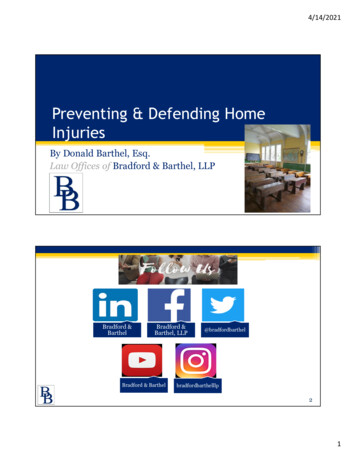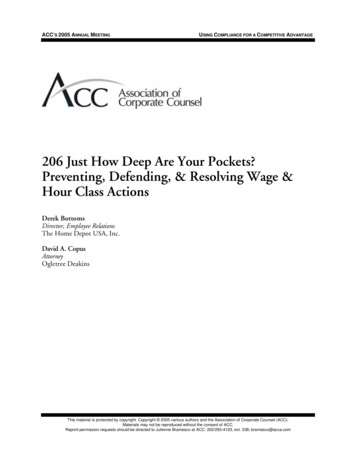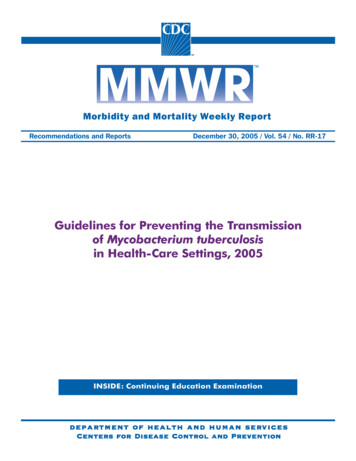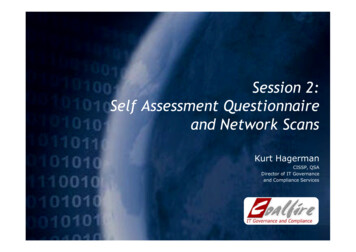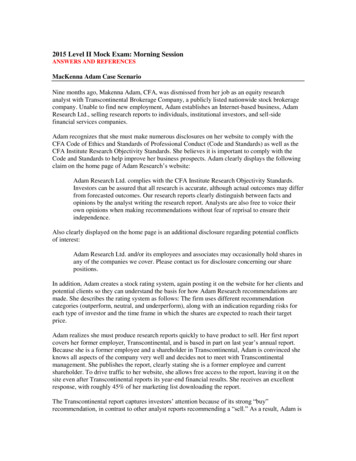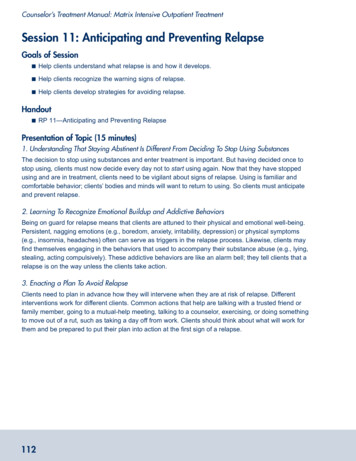
Transcription
Counselor’s Treatment Manual: Matrix Intensive Outpatient TreatmentSession 11: Anticipating and Preventing RelapseGoals of Session Help clients understand what relapse is and how it develops. Help clients recognize the warning signs of relapse. Help clients develop strategies for avoiding relapse.Handout RP 11—Anticipating and Preventing RelapsePresentation of Topic (15 minutes)1. Understanding That Staying Abstinent Is Different From Deciding To Stop Using SubstancesThe decision to stop using substances and enter treatment is important. But having decided once tostop using, clients must now decide every day not to start using again. Now that they have stoppedusing and are in treatment, clients need to be vigilant about signs of relapse. Using is familiar andcomfortable behavior; clients’ bodies and minds will want to return to using. So clients must anticipateand prevent relapse.2. Learning To Recognize Emotional Buildup and Addictive BehaviorsBeing on guard for relapse means that clients are attuned to their physical and emotional well-being.Persistent, nagging emotions (e.g., boredom, anxiety, irritability, depression) or physical symptoms(e.g., insomnia, headaches) often can serve as triggers in the relapse process. Likewise, clients mayfind themselves engaging in the behaviors that used to accompany their substance abuse (e.g., lying,stealing, acting compulsively). These addictive behaviors are like an alarm bell; they tell clients that arelapse is on the way unless the clients take action.3. Enacting a Plan To Avoid RelapseClients need to plan in advance how they will intervene when they are at risk of relapse. Differentinterventions work for different clients. Common actions that help are talking with a trusted friend orfamily member, going to a mutual-help meeting, talking to a counselor, exercising, or doing somethingto move out of a rut, such as taking a day off from work. Clients should think about what will work forthem and be prepared to put their plan into action at the first sign of a relapse.112
V. Relapse Prevention GroupHandout and Focused Discussion (45 minutes)Clients should be given time to complete the handout before the discussion begins. Clients shouldnot be forced to comply if they find it difficult or uncomfortable to complete the handout in the group.The handout is primarily a tool for discussion. The counselor steers clients away from reading theirresponses and encourages them to converse about the issues the handout raises. The counselorensures that all clients have an opportunity to participate. Go over handout RP 11—Anticipating and Preventing Relapse. Make sure clients understand what relapse is and appreciate the importance of relapseprevention. Ask clients to describe the activities that they engaged in when they were using. These areaddictive behaviors. Have these behaviors crept back into their lives? Ask the recovering co-leader to give examples of addictive behavior from his or her experience. Emotional buildup may be a difficult concept for clients to grasp. Ask the recovering co-leader todescribe how emotions can build up and lead to relapse. The concept of addictive thinking will be addressed further in two sessions on relapse justification.For now, have clients discuss justifications for engaging in behaviors that could lead to relapse. Ask clients what indications of an impending relapse they will look out for. Ask clients to share their plans for avoiding relapse. Encourage them to be specific abouttheir plans.Open Discussion (30 minutes)The counselor should carry over from the previous discussion any important issues that have not beenaddressed fully. Although it is important for clients to be able to speak about what is on their minds, thecounselor should make sure that the session’s topic has been explored completely.Five minutes before the end of open discussion, the counselor should ask clients to share briefly theirexperience of doing the homework from the previous session. The counselor can decide how detailedthe followup on homework should be. The goal of asking is not to discover which clients have not donethe homework but to encourage clients to work on their recovery between sessions and to share thatwork with the group.HomeworkAsk clients what they are doing on a regular basis to avoid relapse. Have clients record the steps theyare taking to avoid triggers and stop thoughts of using.113
RP 11Anticipating andPreventing RelapseWhy Is Relapse Prevention Important?Recovery is more than not using drugs and alcohol. The first step in treatment is stop ping drug and alcohol use. The next step is not starting again. This is very important.The process for doing it is called relapse prevention.What Is Relapse?Relapse is going back to substance use and to all the behaviors and patterns thatcome with it. Often the behaviors and patterns return before the substance use.Learning to recognize the beginning of a relapse can help people in recovery stopthe process before they start using again.1 of 3
RP 11Anticipating andPreventing RelapseWhat Are Addictive Behaviors?The things people do as part of abusing drugs or alcohol are called addictive behaviors.Often these are things that addicted people do to get drugs or alcohol, to cover upsubstance abuse, or as part of abusing. Lying, stealing, being unreliable, and actingcompulsively are types of addictive behaviors. When these behaviors reappear, peoplein recovery should be alerted that relapse will soon follow if they do not intervene.What are your addictive behaviors?What Is Addictive Thinking?Addictive thinking means having thoughts that make substance use seem OK.(In 12-Step programs this is known as “stinking thinking.”) Some examples follow: I can handle just one drink. If they think I’m using, I might as well. I have worked hard. I need a break.How have you tried to find excuses to use substances?2 of 3
RP 11Anticipating andPreventing RelapseWhat Is Emotional Buildup?Feelings that don’t seem to go away and just keep getting stron ger cause emotional buildup. Sometimes the feelings seemunbearable. Some feelings that can build are boredom, anxiety,sexual frustration, irritability, and depression.Have you experienced a buildup of any of these emotions?The important step is to take action as soon as you recognize the danger signs.Which actions might help you prevent relapse? Calling a counselor Calling a friend Taking a day off Talking to your family Going to a 12-Step or outside ExercisingTalking to your spouseScheduling time more rigorouslyOther:mutual-help support meeting3 of 3
Addictive thinking means having thoughts that make substance use seem OK. (In 12-Step programs this is known as “stinking thinking.”) Some examples follow: I can handle just one drink. If they think I’m us
